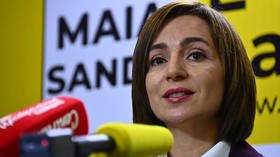Enemy of Russia or practical president? Moscow experts divided as Western analysts celebrate Sandu’s Moldovan election victory

Liberal candidate Maia Sandu has been announced as the winner of Moldova’s presidential election. But while she has been critical of relations with Russia in the past, her country’s foreign policy may not dramatically change.
The former prime minister, who leads the Western leaning Party of Action and Solidarity, beat the incumbent president, Igor Dodon, with close to 58 per cent of the vote in Sunday’s election. Dodon, who had been seen as one of the Kremlin’s closest allies in the region, attracted 42 per cent in the second-round poll. He conceded defeat on Monday morning, saying, “If the courts confirm everything is OK, then we will put a full stop here.” There had previously been fears of unrest after the outcome was announced.
Foreign policy was a key differentiator between the candidates during the campaign, with Sandu, a Harvard-educated former World Bank economist, claiming Dodon’s presidency had seen “relations with the EU and US go from bad to worse.” This was because “Dodon has been trying to establish good relations only with Russia, but even with Russia, he has been using this for his personal interests, not to solve the country’s problems,” she said.
However, some Russian experts have been quick to reject the idea that Sandu’s victory will mean a significant change in Moldova’s approach to its allies. Andrey Suzdaltsev, Deputy Dean of the International Affairs Faculty at Moscow’s prestigious Higher School of Economics, told the RIA Novosti news agency that the Kremlin shouldn’t “be upset about Sandu’s victory in the elections. She is a very practical person and will try to preserve and develop the achievements that Chișinău and Moscow already have.”
He added that “the situation in Moldova is now more or less stable – her political grouping has learned hard lessons from the crises that previously split the country. I think they have [a desire to] preserve stability and a good attitude towards Russia.”
Speaking to RT, Fyodor Lukyanov, Editor-in-chief of the journal Russia in Global Affairs, said that “nothing will change fundamentally in Moldova,” but that it’s “positive that power will change hands calmly and in a civilized way.”
“But, in general,” he added, “the fate of the country is unenviable when the decisive word belongs to those who have left and are unlikely to return.” Voters from Moldova’s diaspora, voting by absentee ballot, overwhelmingly supported Sandu in the first round, giving her around 70 per cent of the overseas vote. For them, Lukyanov explained, “the choice between East and West is literal – where they choose to go and live and earn money.”
For Lukyanov, the outlook for Moldova’s relations with the European Union is far from bright. He argued that the so-called “giants” that dominate foreign policy spheres are “now so absorbed in their own problems that they are much less concerned with peripheral countries and disputes over influence there.”
Not all analysts share that view, with Sergey Markov of the Institute of Political Studies saying on Monday that Sandu is “the political enemy of Russia.” He claimed that, as minister of education, she “spoke in favor of replacing the Russian language with as much English as possible. [And] she always criticized Russia at the earliest opportunity.” Markov also claimed that Sandu supports the “acquisition of Moldova by Romania.”
Also on rt.com Autumn of discontent? Moldova is next US target for ‘color revolution’, Russia's chief spy warns ahead of presidential electionThe two candidates were once coalition partners, after Sandu’s Party of Action and Solidarity agreed to govern with the Socialist Party, which supports Dodon. However, rows over corruption and domestic policy brought the fragile agreement to an end in November last year. Since then, Moldova has struggled with an ailing economy and the impact of the coronavirus pandemic.
Russian President Vladimir Putin congratulated Sandu on her victory on Monday morning. He wrote that he trusted her “activity as head of state will contribute to the constructive development of relations between our countries.” He added that “This would undoubtedly serve the fundamental interests of the peoples of Russia and Moldova.”
If you like this story, share it with a friend!















